Leadership in a Global Context: Analysis of AI on Leadership
VerifiedAdded on 2022/08/14
|11
|2892
|11
Report
AI Summary
This report provides an in-depth analysis of how artificial intelligence (AI) is impacting leadership in a global context. It examines the ways AI is transforming leadership roles, including predictive capabilities, decision-making processes, multitasking abilities, and talent acquisition and development strategies. The report highlights the benefits of AI integration, such as improved accuracy in predictions, enhanced efficiency in decision-making, and the ability to manage multiple business processes effectively. It also addresses the challenges leaders face, including a lack of technical skills, high implementation costs, resistance to change, and reliance on algorithms. The report offers recommendations for leaders to overcome these challenges, such as skill development and understanding the benefits of AI. Overall, the report emphasizes the significant and transformative role of AI in shaping the future of leadership.
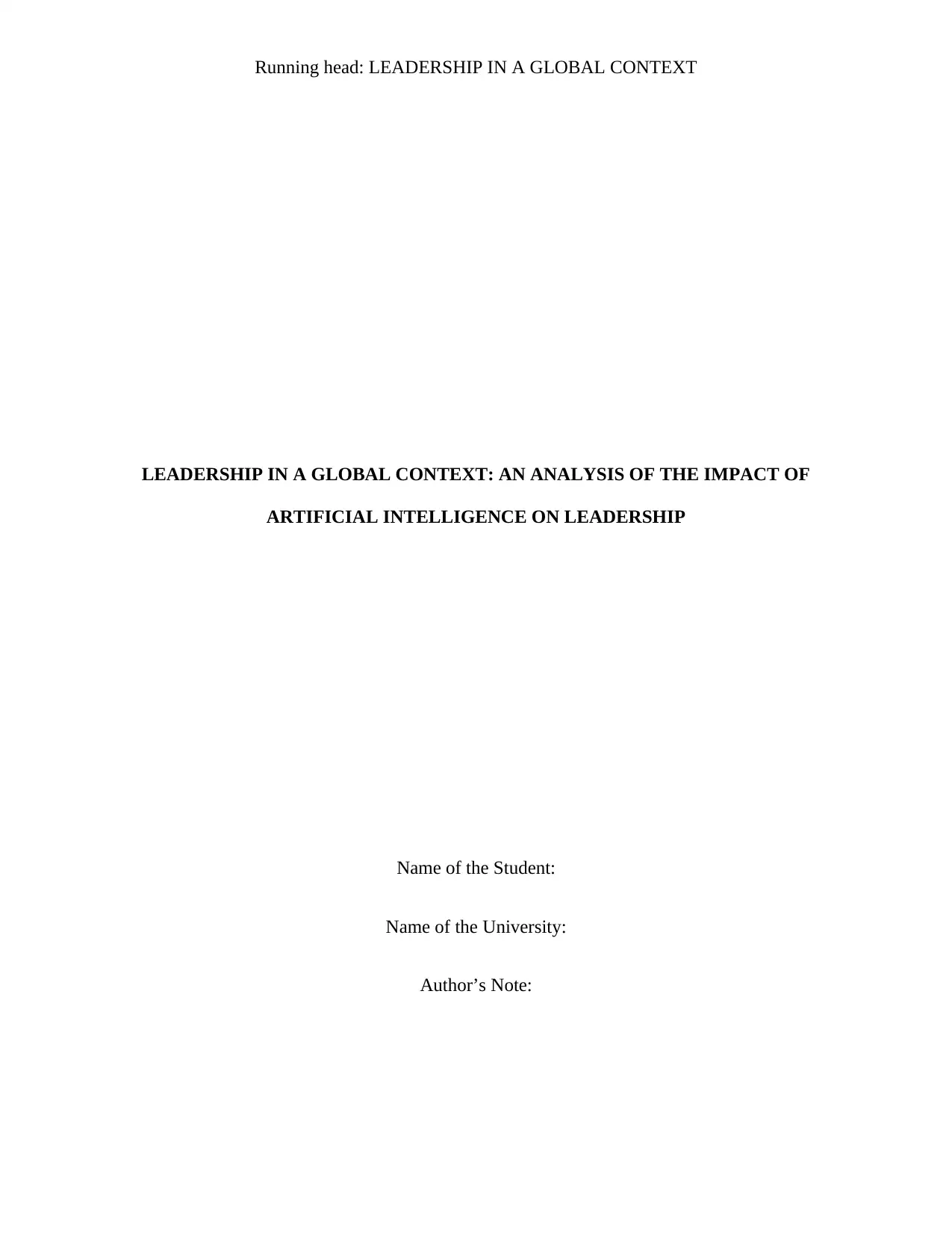
Running head: LEADERSHIP IN A GLOBAL CONTEXT
LEADERSHIP IN A GLOBAL CONTEXT: AN ANALYSIS OF THE IMPACT OF
ARTIFICIAL INTELLIGENCE ON LEADERSHIP
Name of the Student:
Name of the University:
Author’s Note:
LEADERSHIP IN A GLOBAL CONTEXT: AN ANALYSIS OF THE IMPACT OF
ARTIFICIAL INTELLIGENCE ON LEADERSHIP
Name of the Student:
Name of the University:
Author’s Note:
Paraphrase This Document
Need a fresh take? Get an instant paraphrase of this document with our AI Paraphraser
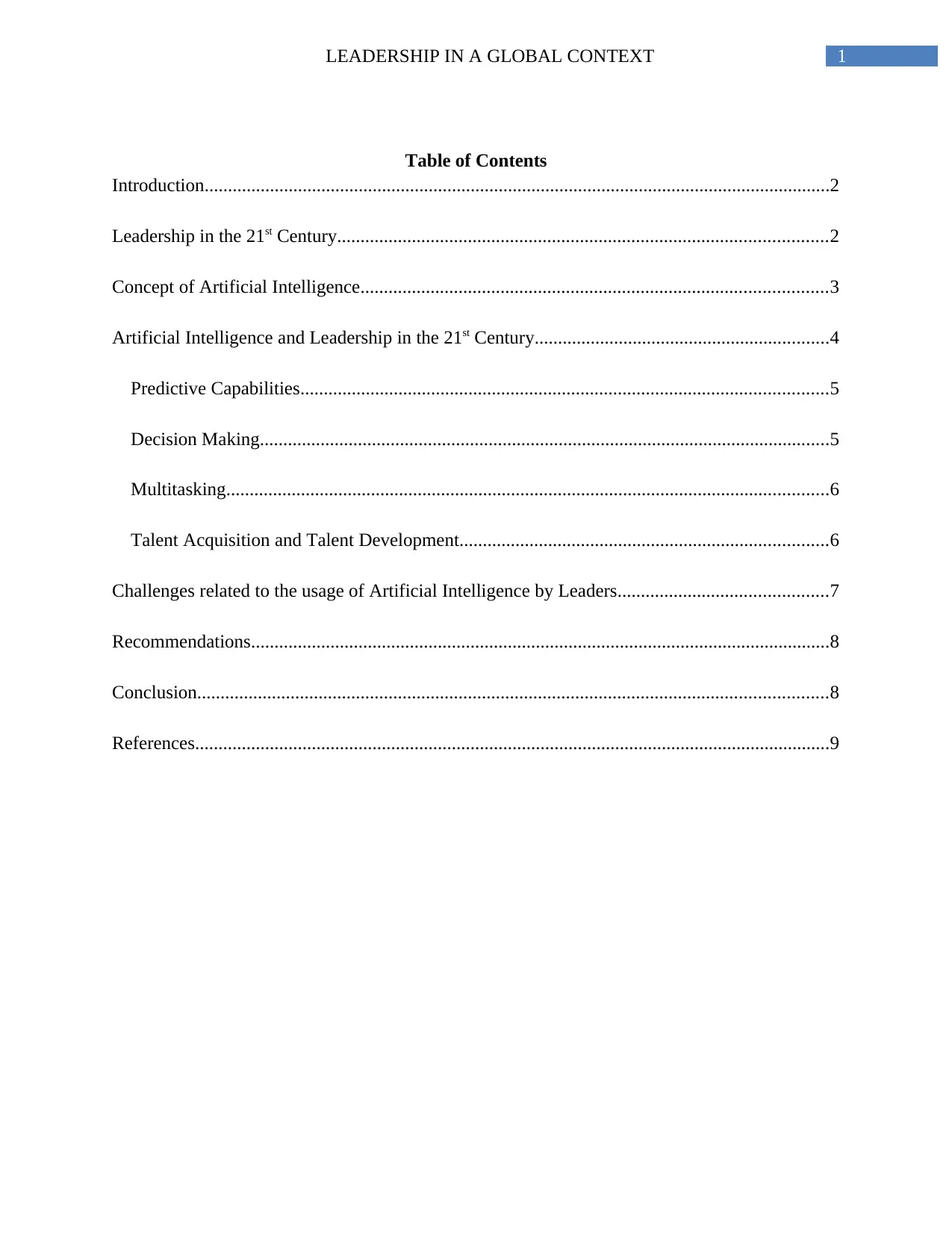
1LEADERSHIP IN A GLOBAL CONTEXT
Table of Contents
Introduction......................................................................................................................................2
Leadership in the 21st Century.........................................................................................................2
Concept of Artificial Intelligence....................................................................................................3
Artificial Intelligence and Leadership in the 21st Century...............................................................4
Predictive Capabilities.................................................................................................................5
Decision Making..........................................................................................................................5
Multitasking.................................................................................................................................6
Talent Acquisition and Talent Development...............................................................................6
Challenges related to the usage of Artificial Intelligence by Leaders.............................................7
Recommendations............................................................................................................................8
Conclusion.......................................................................................................................................8
References........................................................................................................................................9
Table of Contents
Introduction......................................................................................................................................2
Leadership in the 21st Century.........................................................................................................2
Concept of Artificial Intelligence....................................................................................................3
Artificial Intelligence and Leadership in the 21st Century...............................................................4
Predictive Capabilities.................................................................................................................5
Decision Making..........................................................................................................................5
Multitasking.................................................................................................................................6
Talent Acquisition and Talent Development...............................................................................6
Challenges related to the usage of Artificial Intelligence by Leaders.............................................7
Recommendations............................................................................................................................8
Conclusion.......................................................................................................................................8
References........................................................................................................................................9
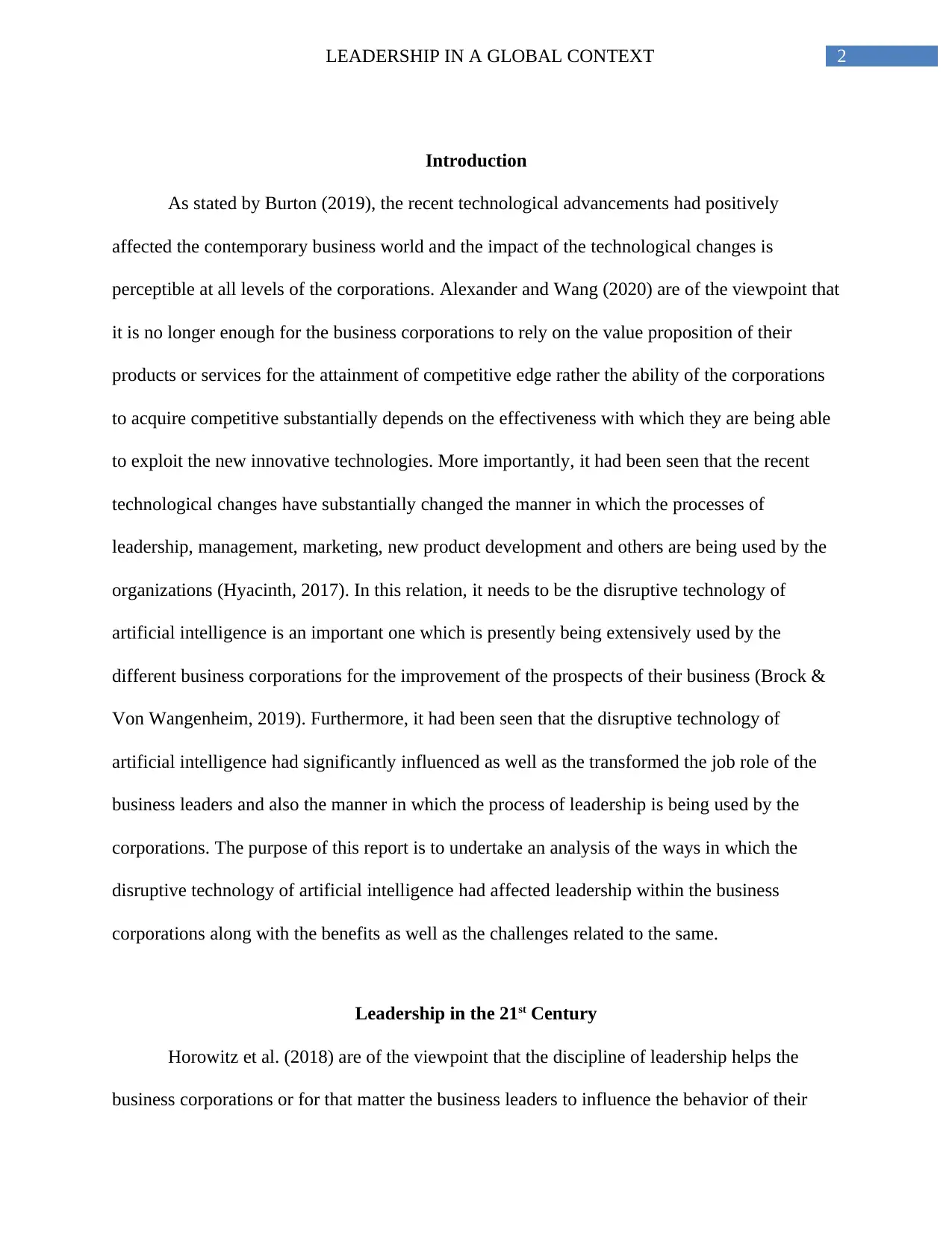
2LEADERSHIP IN A GLOBAL CONTEXT
Introduction
As stated by Burton (2019), the recent technological advancements had positively
affected the contemporary business world and the impact of the technological changes is
perceptible at all levels of the corporations. Alexander and Wang (2020) are of the viewpoint that
it is no longer enough for the business corporations to rely on the value proposition of their
products or services for the attainment of competitive edge rather the ability of the corporations
to acquire competitive substantially depends on the effectiveness with which they are being able
to exploit the new innovative technologies. More importantly, it had been seen that the recent
technological changes have substantially changed the manner in which the processes of
leadership, management, marketing, new product development and others are being used by the
organizations (Hyacinth, 2017). In this relation, it needs to be the disruptive technology of
artificial intelligence is an important one which is presently being extensively used by the
different business corporations for the improvement of the prospects of their business (Brock &
Von Wangenheim, 2019). Furthermore, it had been seen that the disruptive technology of
artificial intelligence had significantly influenced as well as the transformed the job role of the
business leaders and also the manner in which the process of leadership is being used by the
corporations. The purpose of this report is to undertake an analysis of the ways in which the
disruptive technology of artificial intelligence had affected leadership within the business
corporations along with the benefits as well as the challenges related to the same.
Leadership in the 21st Century
Horowitz et al. (2018) are of the viewpoint that the discipline of leadership helps the
business corporations or for that matter the business leaders to influence the behavior of their
Introduction
As stated by Burton (2019), the recent technological advancements had positively
affected the contemporary business world and the impact of the technological changes is
perceptible at all levels of the corporations. Alexander and Wang (2020) are of the viewpoint that
it is no longer enough for the business corporations to rely on the value proposition of their
products or services for the attainment of competitive edge rather the ability of the corporations
to acquire competitive substantially depends on the effectiveness with which they are being able
to exploit the new innovative technologies. More importantly, it had been seen that the recent
technological changes have substantially changed the manner in which the processes of
leadership, management, marketing, new product development and others are being used by the
organizations (Hyacinth, 2017). In this relation, it needs to be the disruptive technology of
artificial intelligence is an important one which is presently being extensively used by the
different business corporations for the improvement of the prospects of their business (Brock &
Von Wangenheim, 2019). Furthermore, it had been seen that the disruptive technology of
artificial intelligence had significantly influenced as well as the transformed the job role of the
business leaders and also the manner in which the process of leadership is being used by the
corporations. The purpose of this report is to undertake an analysis of the ways in which the
disruptive technology of artificial intelligence had affected leadership within the business
corporations along with the benefits as well as the challenges related to the same.
Leadership in the 21st Century
Horowitz et al. (2018) are of the viewpoint that the discipline of leadership helps the
business corporations or for that matter the business leaders to influence the behavior of their
⊘ This is a preview!⊘
Do you want full access?
Subscribe today to unlock all pages.

Trusted by 1+ million students worldwide
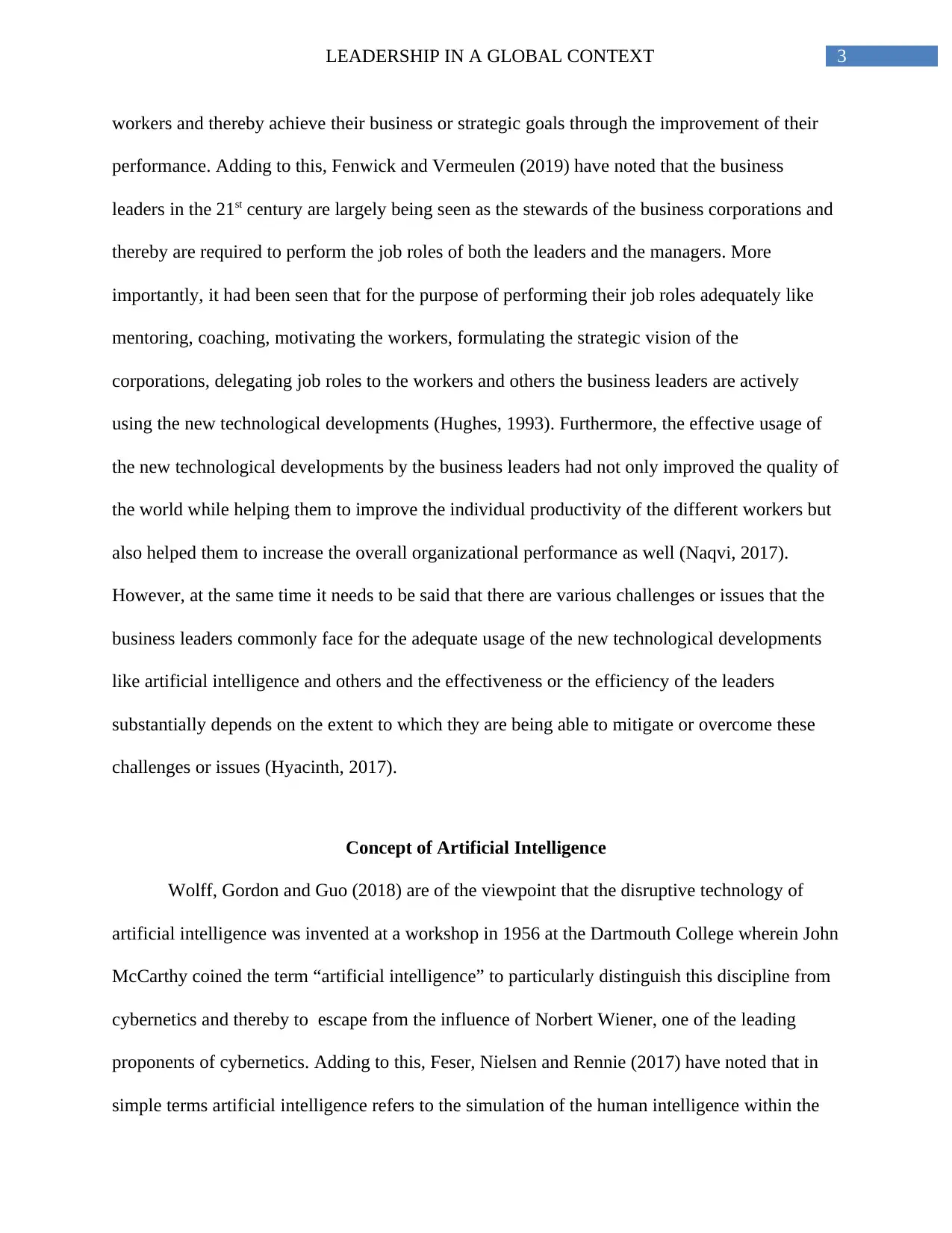
3LEADERSHIP IN A GLOBAL CONTEXT
workers and thereby achieve their business or strategic goals through the improvement of their
performance. Adding to this, Fenwick and Vermeulen (2019) have noted that the business
leaders in the 21st century are largely being seen as the stewards of the business corporations and
thereby are required to perform the job roles of both the leaders and the managers. More
importantly, it had been seen that for the purpose of performing their job roles adequately like
mentoring, coaching, motivating the workers, formulating the strategic vision of the
corporations, delegating job roles to the workers and others the business leaders are actively
using the new technological developments (Hughes, 1993). Furthermore, the effective usage of
the new technological developments by the business leaders had not only improved the quality of
the world while helping them to improve the individual productivity of the different workers but
also helped them to increase the overall organizational performance as well (Naqvi, 2017).
However, at the same time it needs to be said that there are various challenges or issues that the
business leaders commonly face for the adequate usage of the new technological developments
like artificial intelligence and others and the effectiveness or the efficiency of the leaders
substantially depends on the extent to which they are being able to mitigate or overcome these
challenges or issues (Hyacinth, 2017).
Concept of Artificial Intelligence
Wolff, Gordon and Guo (2018) are of the viewpoint that the disruptive technology of
artificial intelligence was invented at a workshop in 1956 at the Dartmouth College wherein John
McCarthy coined the term “artificial intelligence” to particularly distinguish this discipline from
cybernetics and thereby to escape from the influence of Norbert Wiener, one of the leading
proponents of cybernetics. Adding to this, Feser, Nielsen and Rennie (2017) have noted that in
simple terms artificial intelligence refers to the simulation of the human intelligence within the
workers and thereby achieve their business or strategic goals through the improvement of their
performance. Adding to this, Fenwick and Vermeulen (2019) have noted that the business
leaders in the 21st century are largely being seen as the stewards of the business corporations and
thereby are required to perform the job roles of both the leaders and the managers. More
importantly, it had been seen that for the purpose of performing their job roles adequately like
mentoring, coaching, motivating the workers, formulating the strategic vision of the
corporations, delegating job roles to the workers and others the business leaders are actively
using the new technological developments (Hughes, 1993). Furthermore, the effective usage of
the new technological developments by the business leaders had not only improved the quality of
the world while helping them to improve the individual productivity of the different workers but
also helped them to increase the overall organizational performance as well (Naqvi, 2017).
However, at the same time it needs to be said that there are various challenges or issues that the
business leaders commonly face for the adequate usage of the new technological developments
like artificial intelligence and others and the effectiveness or the efficiency of the leaders
substantially depends on the extent to which they are being able to mitigate or overcome these
challenges or issues (Hyacinth, 2017).
Concept of Artificial Intelligence
Wolff, Gordon and Guo (2018) are of the viewpoint that the disruptive technology of
artificial intelligence was invented at a workshop in 1956 at the Dartmouth College wherein John
McCarthy coined the term “artificial intelligence” to particularly distinguish this discipline from
cybernetics and thereby to escape from the influence of Norbert Wiener, one of the leading
proponents of cybernetics. Adding to this, Feser, Nielsen and Rennie (2017) have noted that in
simple terms artificial intelligence refers to the simulation of the human intelligence within the
Paraphrase This Document
Need a fresh take? Get an instant paraphrase of this document with our AI Paraphraser
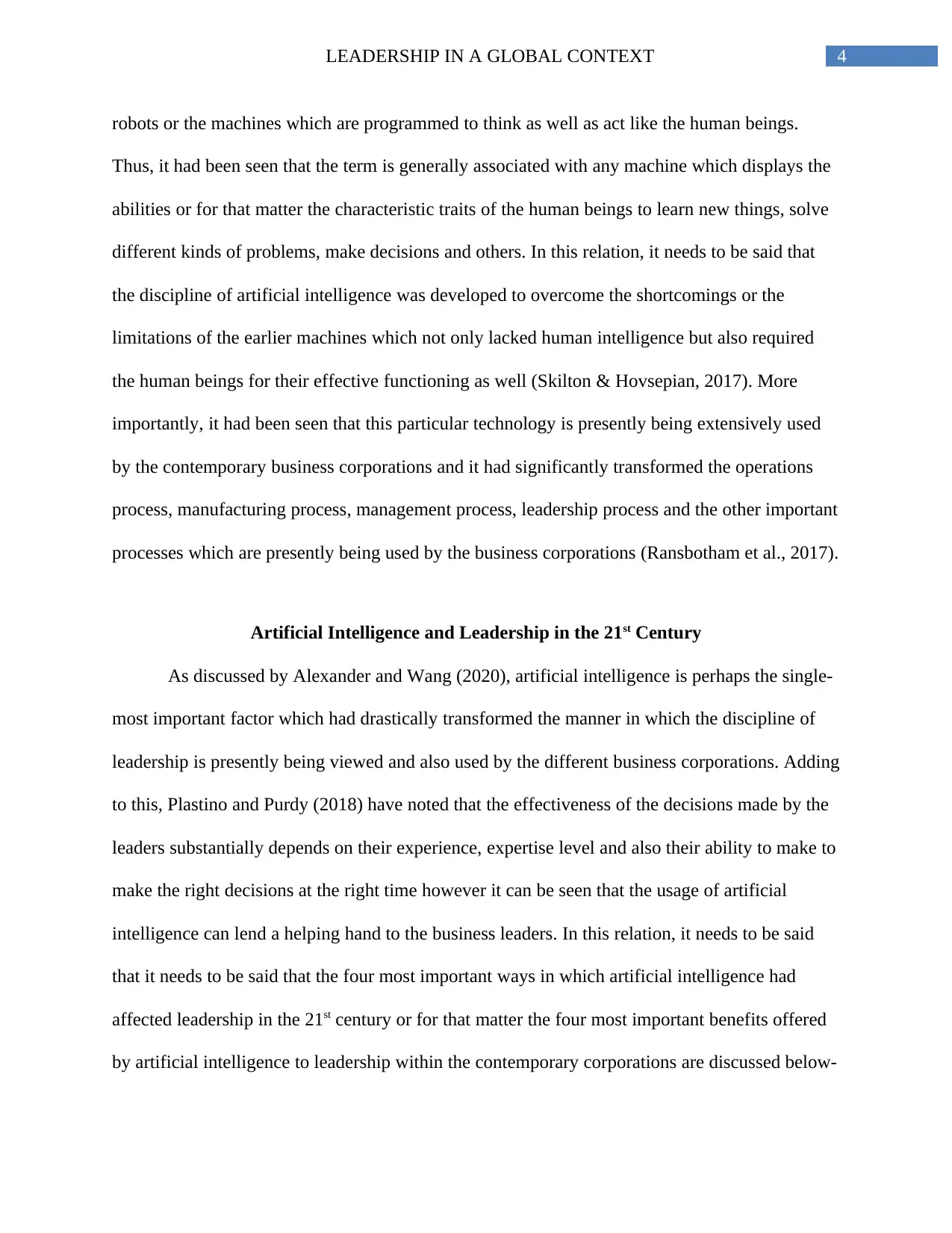
4LEADERSHIP IN A GLOBAL CONTEXT
robots or the machines which are programmed to think as well as act like the human beings.
Thus, it had been seen that the term is generally associated with any machine which displays the
abilities or for that matter the characteristic traits of the human beings to learn new things, solve
different kinds of problems, make decisions and others. In this relation, it needs to be said that
the discipline of artificial intelligence was developed to overcome the shortcomings or the
limitations of the earlier machines which not only lacked human intelligence but also required
the human beings for their effective functioning as well (Skilton & Hovsepian, 2017). More
importantly, it had been seen that this particular technology is presently being extensively used
by the contemporary business corporations and it had significantly transformed the operations
process, manufacturing process, management process, leadership process and the other important
processes which are presently being used by the business corporations (Ransbotham et al., 2017).
Artificial Intelligence and Leadership in the 21st Century
As discussed by Alexander and Wang (2020), artificial intelligence is perhaps the single-
most important factor which had drastically transformed the manner in which the discipline of
leadership is presently being viewed and also used by the different business corporations. Adding
to this, Plastino and Purdy (2018) have noted that the effectiveness of the decisions made by the
leaders substantially depends on their experience, expertise level and also their ability to make to
make the right decisions at the right time however it can be seen that the usage of artificial
intelligence can lend a helping hand to the business leaders. In this relation, it needs to be said
that it needs to be said that the four most important ways in which artificial intelligence had
affected leadership in the 21st century or for that matter the four most important benefits offered
by artificial intelligence to leadership within the contemporary corporations are discussed below-
robots or the machines which are programmed to think as well as act like the human beings.
Thus, it had been seen that the term is generally associated with any machine which displays the
abilities or for that matter the characteristic traits of the human beings to learn new things, solve
different kinds of problems, make decisions and others. In this relation, it needs to be said that
the discipline of artificial intelligence was developed to overcome the shortcomings or the
limitations of the earlier machines which not only lacked human intelligence but also required
the human beings for their effective functioning as well (Skilton & Hovsepian, 2017). More
importantly, it had been seen that this particular technology is presently being extensively used
by the contemporary business corporations and it had significantly transformed the operations
process, manufacturing process, management process, leadership process and the other important
processes which are presently being used by the business corporations (Ransbotham et al., 2017).
Artificial Intelligence and Leadership in the 21st Century
As discussed by Alexander and Wang (2020), artificial intelligence is perhaps the single-
most important factor which had drastically transformed the manner in which the discipline of
leadership is presently being viewed and also used by the different business corporations. Adding
to this, Plastino and Purdy (2018) have noted that the effectiveness of the decisions made by the
leaders substantially depends on their experience, expertise level and also their ability to make to
make the right decisions at the right time however it can be seen that the usage of artificial
intelligence can lend a helping hand to the business leaders. In this relation, it needs to be said
that it needs to be said that the four most important ways in which artificial intelligence had
affected leadership in the 21st century or for that matter the four most important benefits offered
by artificial intelligence to leadership within the contemporary corporations are discussed below-
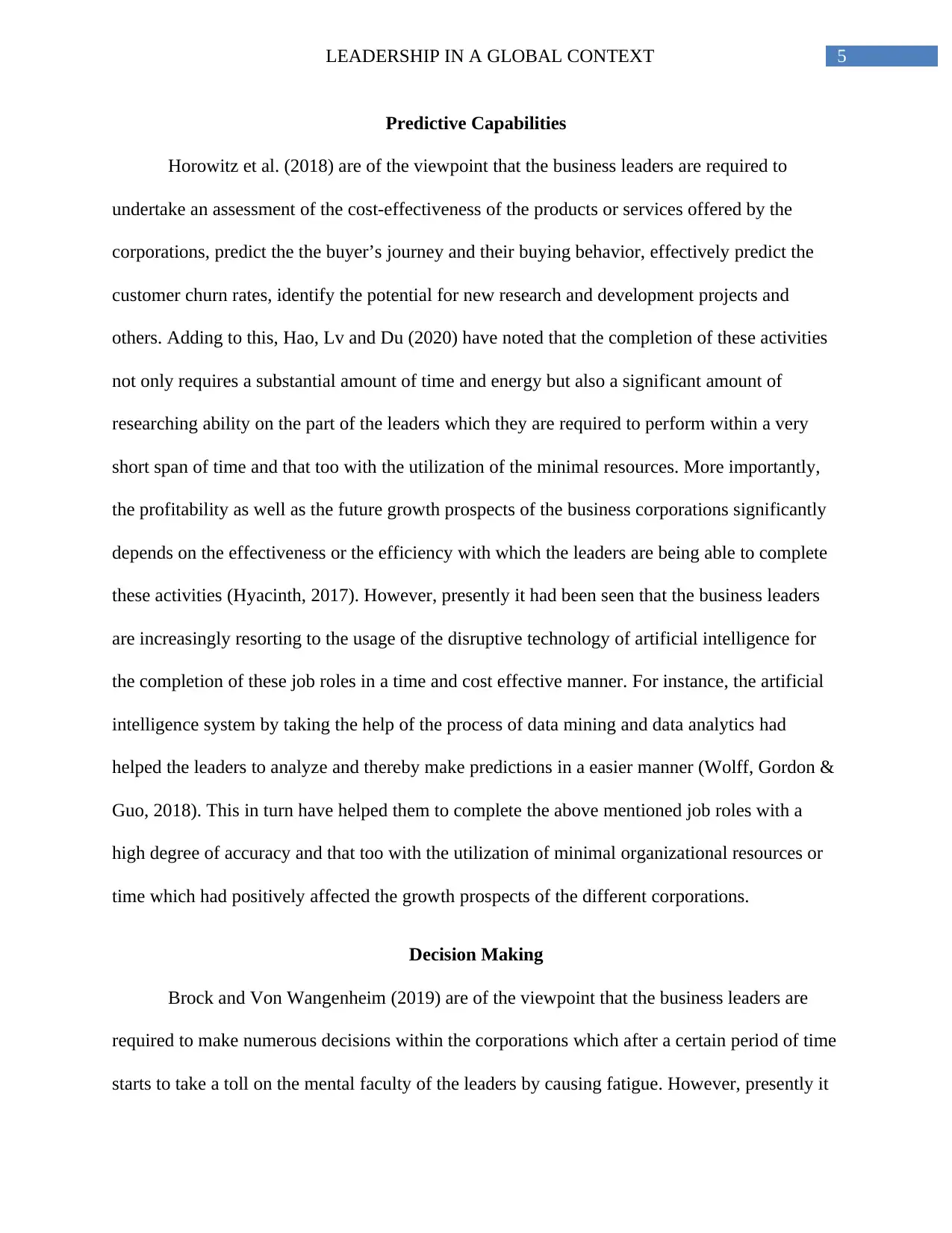
5LEADERSHIP IN A GLOBAL CONTEXT
Predictive Capabilities
Horowitz et al. (2018) are of the viewpoint that the business leaders are required to
undertake an assessment of the cost-effectiveness of the products or services offered by the
corporations, predict the the buyer’s journey and their buying behavior, effectively predict the
customer churn rates, identify the potential for new research and development projects and
others. Adding to this, Hao, Lv and Du (2020) have noted that the completion of these activities
not only requires a substantial amount of time and energy but also a significant amount of
researching ability on the part of the leaders which they are required to perform within a very
short span of time and that too with the utilization of the minimal resources. More importantly,
the profitability as well as the future growth prospects of the business corporations significantly
depends on the effectiveness or the efficiency with which the leaders are being able to complete
these activities (Hyacinth, 2017). However, presently it had been seen that the business leaders
are increasingly resorting to the usage of the disruptive technology of artificial intelligence for
the completion of these job roles in a time and cost effective manner. For instance, the artificial
intelligence system by taking the help of the process of data mining and data analytics had
helped the leaders to analyze and thereby make predictions in a easier manner (Wolff, Gordon &
Guo, 2018). This in turn have helped them to complete the above mentioned job roles with a
high degree of accuracy and that too with the utilization of minimal organizational resources or
time which had positively affected the growth prospects of the different corporations.
Decision Making
Brock and Von Wangenheim (2019) are of the viewpoint that the business leaders are
required to make numerous decisions within the corporations which after a certain period of time
starts to take a toll on the mental faculty of the leaders by causing fatigue. However, presently it
Predictive Capabilities
Horowitz et al. (2018) are of the viewpoint that the business leaders are required to
undertake an assessment of the cost-effectiveness of the products or services offered by the
corporations, predict the the buyer’s journey and their buying behavior, effectively predict the
customer churn rates, identify the potential for new research and development projects and
others. Adding to this, Hao, Lv and Du (2020) have noted that the completion of these activities
not only requires a substantial amount of time and energy but also a significant amount of
researching ability on the part of the leaders which they are required to perform within a very
short span of time and that too with the utilization of the minimal resources. More importantly,
the profitability as well as the future growth prospects of the business corporations significantly
depends on the effectiveness or the efficiency with which the leaders are being able to complete
these activities (Hyacinth, 2017). However, presently it had been seen that the business leaders
are increasingly resorting to the usage of the disruptive technology of artificial intelligence for
the completion of these job roles in a time and cost effective manner. For instance, the artificial
intelligence system by taking the help of the process of data mining and data analytics had
helped the leaders to analyze and thereby make predictions in a easier manner (Wolff, Gordon &
Guo, 2018). This in turn have helped them to complete the above mentioned job roles with a
high degree of accuracy and that too with the utilization of minimal organizational resources or
time which had positively affected the growth prospects of the different corporations.
Decision Making
Brock and Von Wangenheim (2019) are of the viewpoint that the business leaders are
required to make numerous decisions within the corporations which after a certain period of time
starts to take a toll on the mental faculty of the leaders by causing fatigue. However, presently it
⊘ This is a preview!⊘
Do you want full access?
Subscribe today to unlock all pages.

Trusted by 1+ million students worldwide
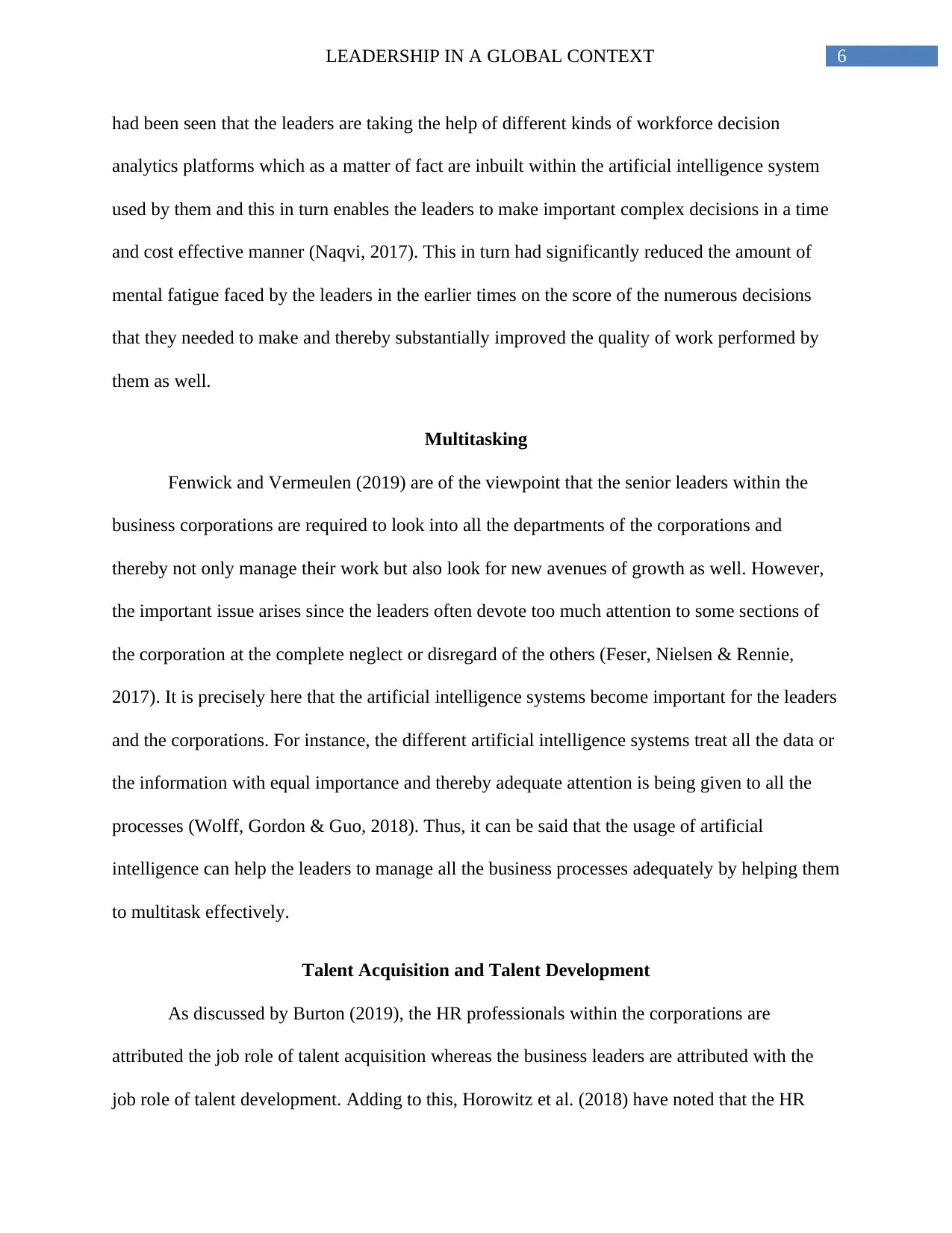
6LEADERSHIP IN A GLOBAL CONTEXT
had been seen that the leaders are taking the help of different kinds of workforce decision
analytics platforms which as a matter of fact are inbuilt within the artificial intelligence system
used by them and this in turn enables the leaders to make important complex decisions in a time
and cost effective manner (Naqvi, 2017). This in turn had significantly reduced the amount of
mental fatigue faced by the leaders in the earlier times on the score of the numerous decisions
that they needed to make and thereby substantially improved the quality of work performed by
them as well.
Multitasking
Fenwick and Vermeulen (2019) are of the viewpoint that the senior leaders within the
business corporations are required to look into all the departments of the corporations and
thereby not only manage their work but also look for new avenues of growth as well. However,
the important issue arises since the leaders often devote too much attention to some sections of
the corporation at the complete neglect or disregard of the others (Feser, Nielsen & Rennie,
2017). It is precisely here that the artificial intelligence systems become important for the leaders
and the corporations. For instance, the different artificial intelligence systems treat all the data or
the information with equal importance and thereby adequate attention is being given to all the
processes (Wolff, Gordon & Guo, 2018). Thus, it can be said that the usage of artificial
intelligence can help the leaders to manage all the business processes adequately by helping them
to multitask effectively.
Talent Acquisition and Talent Development
As discussed by Burton (2019), the HR professionals within the corporations are
attributed the job role of talent acquisition whereas the business leaders are attributed with the
job role of talent development. Adding to this, Horowitz et al. (2018) have noted that the HR
had been seen that the leaders are taking the help of different kinds of workforce decision
analytics platforms which as a matter of fact are inbuilt within the artificial intelligence system
used by them and this in turn enables the leaders to make important complex decisions in a time
and cost effective manner (Naqvi, 2017). This in turn had significantly reduced the amount of
mental fatigue faced by the leaders in the earlier times on the score of the numerous decisions
that they needed to make and thereby substantially improved the quality of work performed by
them as well.
Multitasking
Fenwick and Vermeulen (2019) are of the viewpoint that the senior leaders within the
business corporations are required to look into all the departments of the corporations and
thereby not only manage their work but also look for new avenues of growth as well. However,
the important issue arises since the leaders often devote too much attention to some sections of
the corporation at the complete neglect or disregard of the others (Feser, Nielsen & Rennie,
2017). It is precisely here that the artificial intelligence systems become important for the leaders
and the corporations. For instance, the different artificial intelligence systems treat all the data or
the information with equal importance and thereby adequate attention is being given to all the
processes (Wolff, Gordon & Guo, 2018). Thus, it can be said that the usage of artificial
intelligence can help the leaders to manage all the business processes adequately by helping them
to multitask effectively.
Talent Acquisition and Talent Development
As discussed by Burton (2019), the HR professionals within the corporations are
attributed the job role of talent acquisition whereas the business leaders are attributed with the
job role of talent development. Adding to this, Horowitz et al. (2018) have noted that the HR
Paraphrase This Document
Need a fresh take? Get an instant paraphrase of this document with our AI Paraphraser
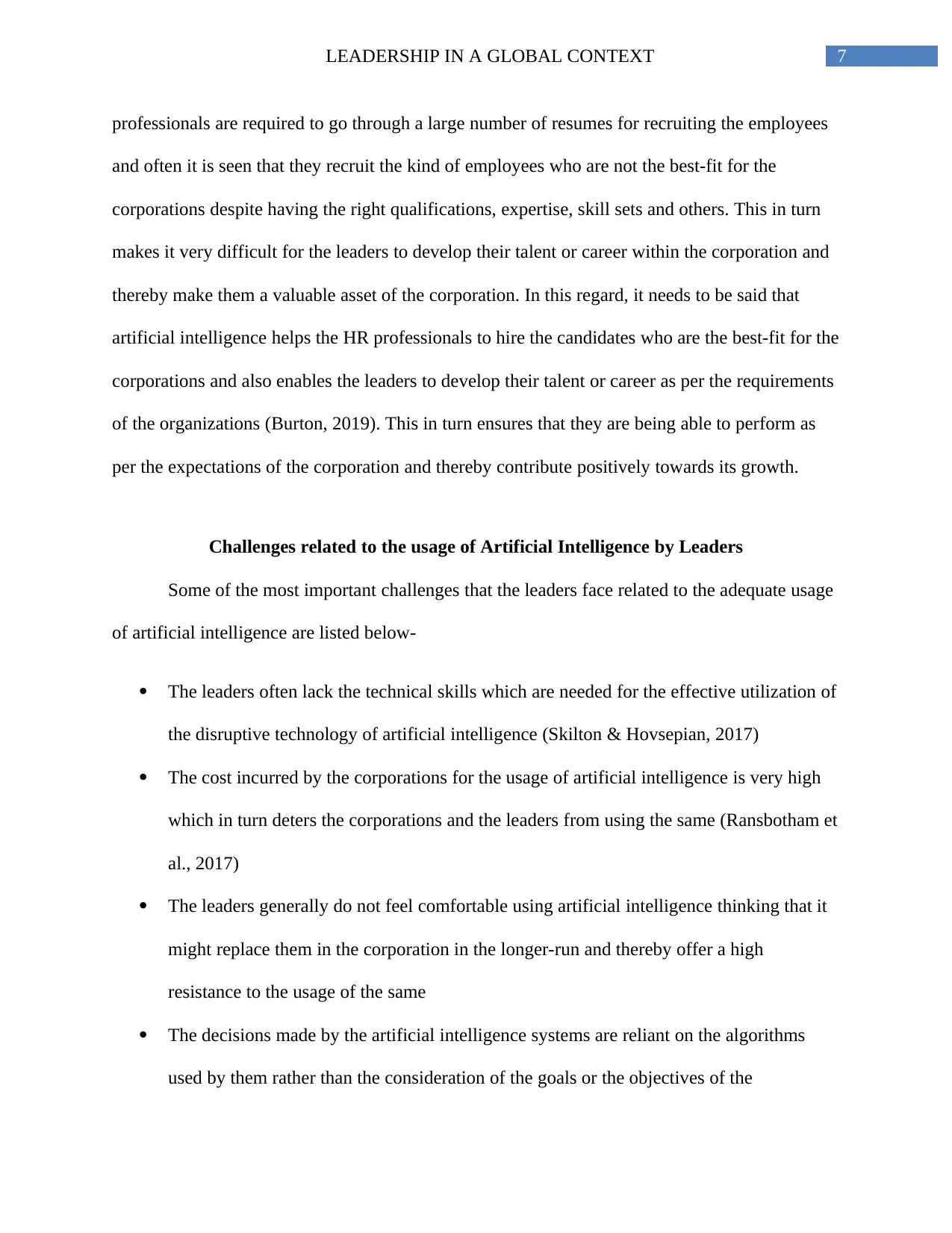
7LEADERSHIP IN A GLOBAL CONTEXT
professionals are required to go through a large number of resumes for recruiting the employees
and often it is seen that they recruit the kind of employees who are not the best-fit for the
corporations despite having the right qualifications, expertise, skill sets and others. This in turn
makes it very difficult for the leaders to develop their talent or career within the corporation and
thereby make them a valuable asset of the corporation. In this regard, it needs to be said that
artificial intelligence helps the HR professionals to hire the candidates who are the best-fit for the
corporations and also enables the leaders to develop their talent or career as per the requirements
of the organizations (Burton, 2019). This in turn ensures that they are being able to perform as
per the expectations of the corporation and thereby contribute positively towards its growth.
Challenges related to the usage of Artificial Intelligence by Leaders
Some of the most important challenges that the leaders face related to the adequate usage
of artificial intelligence are listed below-
The leaders often lack the technical skills which are needed for the effective utilization of
the disruptive technology of artificial intelligence (Skilton & Hovsepian, 2017)
The cost incurred by the corporations for the usage of artificial intelligence is very high
which in turn deters the corporations and the leaders from using the same (Ransbotham et
al., 2017)
The leaders generally do not feel comfortable using artificial intelligence thinking that it
might replace them in the corporation in the longer-run and thereby offer a high
resistance to the usage of the same
The decisions made by the artificial intelligence systems are reliant on the algorithms
used by them rather than the consideration of the goals or the objectives of the
professionals are required to go through a large number of resumes for recruiting the employees
and often it is seen that they recruit the kind of employees who are not the best-fit for the
corporations despite having the right qualifications, expertise, skill sets and others. This in turn
makes it very difficult for the leaders to develop their talent or career within the corporation and
thereby make them a valuable asset of the corporation. In this regard, it needs to be said that
artificial intelligence helps the HR professionals to hire the candidates who are the best-fit for the
corporations and also enables the leaders to develop their talent or career as per the requirements
of the organizations (Burton, 2019). This in turn ensures that they are being able to perform as
per the expectations of the corporation and thereby contribute positively towards its growth.
Challenges related to the usage of Artificial Intelligence by Leaders
Some of the most important challenges that the leaders face related to the adequate usage
of artificial intelligence are listed below-
The leaders often lack the technical skills which are needed for the effective utilization of
the disruptive technology of artificial intelligence (Skilton & Hovsepian, 2017)
The cost incurred by the corporations for the usage of artificial intelligence is very high
which in turn deters the corporations and the leaders from using the same (Ransbotham et
al., 2017)
The leaders generally do not feel comfortable using artificial intelligence thinking that it
might replace them in the corporation in the longer-run and thereby offer a high
resistance to the usage of the same
The decisions made by the artificial intelligence systems are reliant on the algorithms
used by them rather than the consideration of the goals or the objectives of the
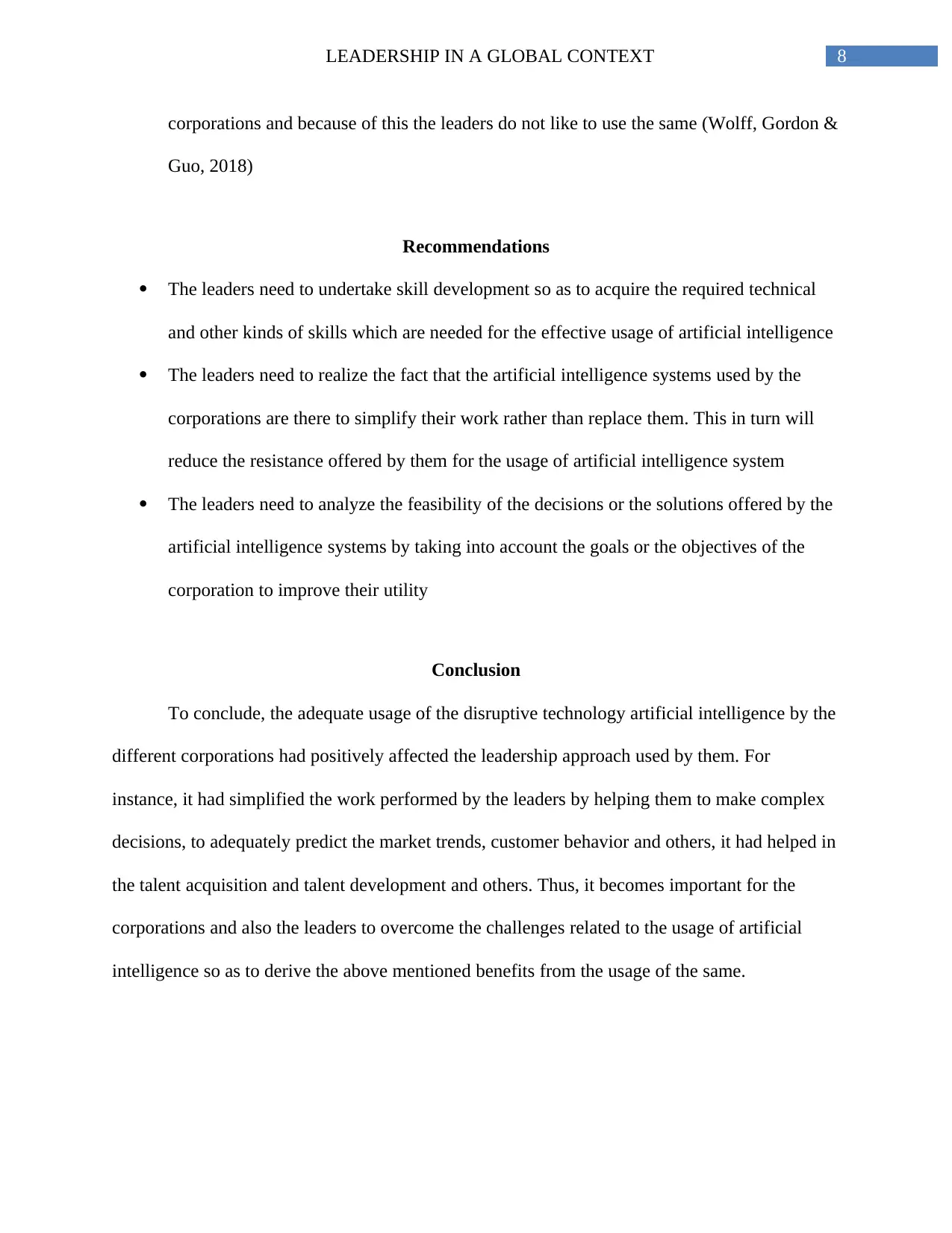
8LEADERSHIP IN A GLOBAL CONTEXT
corporations and because of this the leaders do not like to use the same (Wolff, Gordon &
Guo, 2018)
Recommendations
The leaders need to undertake skill development so as to acquire the required technical
and other kinds of skills which are needed for the effective usage of artificial intelligence
The leaders need to realize the fact that the artificial intelligence systems used by the
corporations are there to simplify their work rather than replace them. This in turn will
reduce the resistance offered by them for the usage of artificial intelligence system
The leaders need to analyze the feasibility of the decisions or the solutions offered by the
artificial intelligence systems by taking into account the goals or the objectives of the
corporation to improve their utility
Conclusion
To conclude, the adequate usage of the disruptive technology artificial intelligence by the
different corporations had positively affected the leadership approach used by them. For
instance, it had simplified the work performed by the leaders by helping them to make complex
decisions, to adequately predict the market trends, customer behavior and others, it had helped in
the talent acquisition and talent development and others. Thus, it becomes important for the
corporations and also the leaders to overcome the challenges related to the usage of artificial
intelligence so as to derive the above mentioned benefits from the usage of the same.
corporations and because of this the leaders do not like to use the same (Wolff, Gordon &
Guo, 2018)
Recommendations
The leaders need to undertake skill development so as to acquire the required technical
and other kinds of skills which are needed for the effective usage of artificial intelligence
The leaders need to realize the fact that the artificial intelligence systems used by the
corporations are there to simplify their work rather than replace them. This in turn will
reduce the resistance offered by them for the usage of artificial intelligence system
The leaders need to analyze the feasibility of the decisions or the solutions offered by the
artificial intelligence systems by taking into account the goals or the objectives of the
corporation to improve their utility
Conclusion
To conclude, the adequate usage of the disruptive technology artificial intelligence by the
different corporations had positively affected the leadership approach used by them. For
instance, it had simplified the work performed by the leaders by helping them to make complex
decisions, to adequately predict the market trends, customer behavior and others, it had helped in
the talent acquisition and talent development and others. Thus, it becomes important for the
corporations and also the leaders to overcome the challenges related to the usage of artificial
intelligence so as to derive the above mentioned benefits from the usage of the same.
⊘ This is a preview!⊘
Do you want full access?
Subscribe today to unlock all pages.

Trusted by 1+ million students worldwide
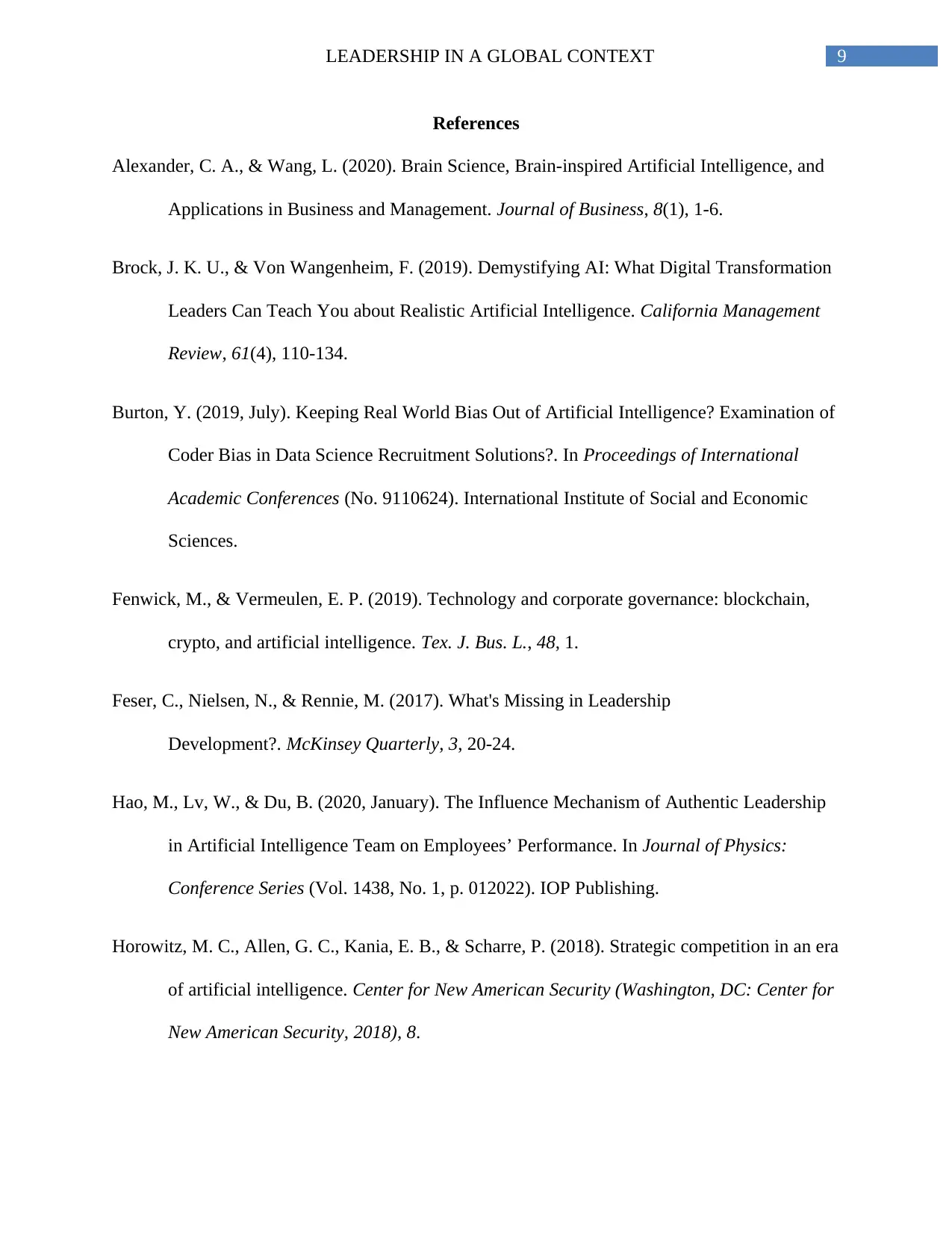
9LEADERSHIP IN A GLOBAL CONTEXT
References
Alexander, C. A., & Wang, L. (2020). Brain Science, Brain-inspired Artificial Intelligence, and
Applications in Business and Management. Journal of Business, 8(1), 1-6.
Brock, J. K. U., & Von Wangenheim, F. (2019). Demystifying AI: What Digital Transformation
Leaders Can Teach You about Realistic Artificial Intelligence. California Management
Review, 61(4), 110-134.
Burton, Y. (2019, July). Keeping Real World Bias Out of Artificial Intelligence? Examination of
Coder Bias in Data Science Recruitment Solutions?. In Proceedings of International
Academic Conferences (No. 9110624). International Institute of Social and Economic
Sciences.
Fenwick, M., & Vermeulen, E. P. (2019). Technology and corporate governance: blockchain,
crypto, and artificial intelligence. Tex. J. Bus. L., 48, 1.
Feser, C., Nielsen, N., & Rennie, M. (2017). What's Missing in Leadership
Development?. McKinsey Quarterly, 3, 20-24.
Hao, M., Lv, W., & Du, B. (2020, January). The Influence Mechanism of Authentic Leadership
in Artificial Intelligence Team on Employees’ Performance. In Journal of Physics:
Conference Series (Vol. 1438, No. 1, p. 012022). IOP Publishing.
Horowitz, M. C., Allen, G. C., Kania, E. B., & Scharre, P. (2018). Strategic competition in an era
of artificial intelligence. Center for New American Security (Washington, DC: Center for
New American Security, 2018), 8.
References
Alexander, C. A., & Wang, L. (2020). Brain Science, Brain-inspired Artificial Intelligence, and
Applications in Business and Management. Journal of Business, 8(1), 1-6.
Brock, J. K. U., & Von Wangenheim, F. (2019). Demystifying AI: What Digital Transformation
Leaders Can Teach You about Realistic Artificial Intelligence. California Management
Review, 61(4), 110-134.
Burton, Y. (2019, July). Keeping Real World Bias Out of Artificial Intelligence? Examination of
Coder Bias in Data Science Recruitment Solutions?. In Proceedings of International
Academic Conferences (No. 9110624). International Institute of Social and Economic
Sciences.
Fenwick, M., & Vermeulen, E. P. (2019). Technology and corporate governance: blockchain,
crypto, and artificial intelligence. Tex. J. Bus. L., 48, 1.
Feser, C., Nielsen, N., & Rennie, M. (2017). What's Missing in Leadership
Development?. McKinsey Quarterly, 3, 20-24.
Hao, M., Lv, W., & Du, B. (2020, January). The Influence Mechanism of Authentic Leadership
in Artificial Intelligence Team on Employees’ Performance. In Journal of Physics:
Conference Series (Vol. 1438, No. 1, p. 012022). IOP Publishing.
Horowitz, M. C., Allen, G. C., Kania, E. B., & Scharre, P. (2018). Strategic competition in an era
of artificial intelligence. Center for New American Security (Washington, DC: Center for
New American Security, 2018), 8.
Paraphrase This Document
Need a fresh take? Get an instant paraphrase of this document with our AI Paraphraser
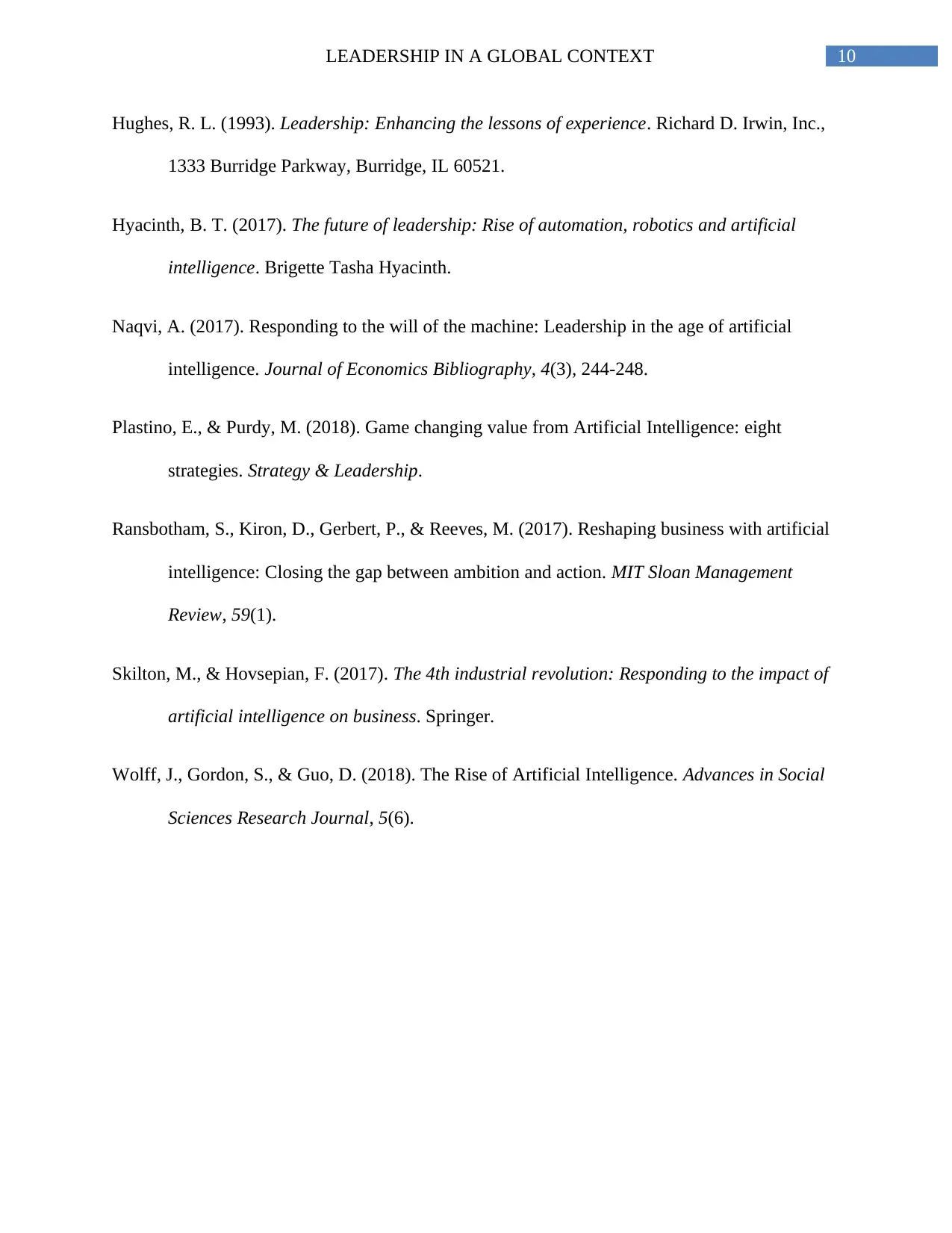
10LEADERSHIP IN A GLOBAL CONTEXT
Hughes, R. L. (1993). Leadership: Enhancing the lessons of experience. Richard D. Irwin, Inc.,
1333 Burridge Parkway, Burridge, IL 60521.
Hyacinth, B. T. (2017). The future of leadership: Rise of automation, robotics and artificial
intelligence. Brigette Tasha Hyacinth.
Naqvi, A. (2017). Responding to the will of the machine: Leadership in the age of artificial
intelligence. Journal of Economics Bibliography, 4(3), 244-248.
Plastino, E., & Purdy, M. (2018). Game changing value from Artificial Intelligence: eight
strategies. Strategy & Leadership.
Ransbotham, S., Kiron, D., Gerbert, P., & Reeves, M. (2017). Reshaping business with artificial
intelligence: Closing the gap between ambition and action. MIT Sloan Management
Review, 59(1).
Skilton, M., & Hovsepian, F. (2017). The 4th industrial revolution: Responding to the impact of
artificial intelligence on business. Springer.
Wolff, J., Gordon, S., & Guo, D. (2018). The Rise of Artificial Intelligence. Advances in Social
Sciences Research Journal, 5(6).
Hughes, R. L. (1993). Leadership: Enhancing the lessons of experience. Richard D. Irwin, Inc.,
1333 Burridge Parkway, Burridge, IL 60521.
Hyacinth, B. T. (2017). The future of leadership: Rise of automation, robotics and artificial
intelligence. Brigette Tasha Hyacinth.
Naqvi, A. (2017). Responding to the will of the machine: Leadership in the age of artificial
intelligence. Journal of Economics Bibliography, 4(3), 244-248.
Plastino, E., & Purdy, M. (2018). Game changing value from Artificial Intelligence: eight
strategies. Strategy & Leadership.
Ransbotham, S., Kiron, D., Gerbert, P., & Reeves, M. (2017). Reshaping business with artificial
intelligence: Closing the gap between ambition and action. MIT Sloan Management
Review, 59(1).
Skilton, M., & Hovsepian, F. (2017). The 4th industrial revolution: Responding to the impact of
artificial intelligence on business. Springer.
Wolff, J., Gordon, S., & Guo, D. (2018). The Rise of Artificial Intelligence. Advances in Social
Sciences Research Journal, 5(6).
1 out of 11
Related Documents
Your All-in-One AI-Powered Toolkit for Academic Success.
+13062052269
info@desklib.com
Available 24*7 on WhatsApp / Email
![[object Object]](/_next/static/media/star-bottom.7253800d.svg)
Unlock your academic potential
Copyright © 2020–2025 A2Z Services. All Rights Reserved. Developed and managed by ZUCOL.





